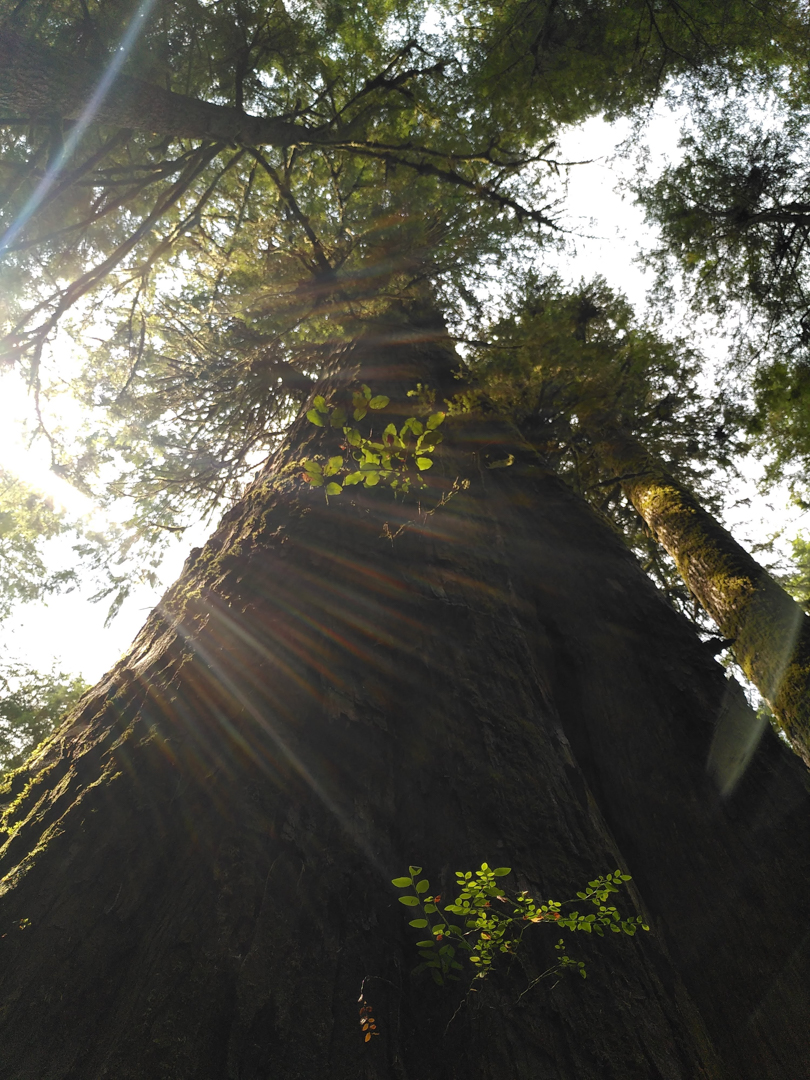 Save Old Growth is a civil disobedience movement whose aim is to “create a national discussion about the fact that we are faced with an extermination event” by repeatedly blocking the Trans Canada Highway.
Save Old Growth is a civil disobedience movement whose aim is to “create a national discussion about the fact that we are faced with an extermination event” by repeatedly blocking the Trans Canada Highway.
Johannah, a 19-year-old biology student, is one of the coordinators of the Save Old Growth campaign. She got involved in this direct-action movement in October 2021 after visiting the Fairy Creek blockade and seeing what protecting old growth forests was like on the front lines.
“It was a really eye-opening experience for me to see the beauty of the ecosystem there and how many people were willing to stand up and fight for that,” said Johannah.
During this trip, Johannah also realized that she had that same power to create change, so she got involved in the Save Old Growth campaign to bring this fight out of the bush and into the city where protestors and blockaders are harder to ignore. While the Fairy Creek blockades act as the defense, Save Old Growth is the offense.
Save Old Growth’s main strategy is creating human traffic blockades on the Trans Canada highway where protestors will physically sit on the road, sometimes even supergluing themselves to the concrete, to be removed only through police intervention.
Similar civil disobedience campaigns have been fought around the world, where non-violent citizen groups put pressure on the government to make concrete changes regarding their specific demands. Such a group is Insulate Britain, who went from zero to 77 per cent name recognition in the U.K. within three weeks. Their demands were for the government to lower carbon emissions, create jobs, and save people from freezing to death in their homes over the winter by insulating houses. The group blocked major highways in the country repeatedly until the government was forced to meet their demands.
“We’re essentially locked in for a two degree increase in the global temperature,” said Johannah. “That’s what scientists have been saying for a while. We used to have time to avoid that, and now we’re really quickly running out of time to make meaningful change.”
A two degree increase may not seem like a lot, but in reality this means food shortages, starvation, and conflict. Studies show that 1.2 billion people could be displaced by climate disasters by the year 2050.
“The government knows that,” said Johannah, “the leading scientists know that, yet despite that … they’re continuing to log these thousand year-old trees and I think that’s just absolutely unacceptable.”
The majority of people in B.C. are against old-growth logging. However, many are hesitant to join the resistance and get involved in this movement because they believe that their protests will ultimately fall on deaf ears. So many climate movements in the past have failed due to campaigners burning out or because their actions are too easy for the government to ignore.
Johannah explained that this highly-strategic, six month-long campaign around a single, specific demand will hopefully be successful because of their coordination with similar movements around the world and their protests that capture the attention of the public.
“It’s something that can’t be ignored,” said Johannah. “It builds up enough momentum, and as people see that momentum building and they see regular people are able to do something big like this and make a change, I really hope that’s going to open people’s eyes and [make them] realize they do have the power to make change.
“I personally really dislike the tactic,” said Johannah. “I really don’t like doing it … It pisses a lot of people off. But the idea is that it pisses so many people off that they can’t help but talk about it.”
The majority of people would agree that cutting down thousand-year-old trees and destroying the rich biodiversity these environments contain is wrong, yet this practice is still happening everyday, with less than 3 per cent of old growth forests in BC remaining. The point of the campaign is to put such immense pressure on the government that they have no choice but to immediately end old growth logging.
It’s too late for easy-to-ignore campaigns like picketing outside Parliament and signing petitions. In order to see any change, activists are forced to enact highly disruptive methods. The campaign won’t put an end to climate change, but it will provide a much-needed win in the environmental movement. This win will hopefully create a snowball effect that will encourage more citizen-led direct-action campaigns around the world.
If you want to go down fighting, join this campaign. To be a part of an action you need to first attend a virtual talk orienting yourself to the group’s mission and an in-person training about nonviolent civil resistance. After completing this training you will be put in a team, assigned a role, and can start blocking highways.
Attend the talk on Saturday, Mar. 6 at 3:00 p.m. in Matsqui Recreation Center to learn more.
If you’re interested, direct message the Instagram account @ Save Old Growth, or email saveoldgrowth@protonmail.com with the following information: your name, phone number, city of residence, and how many times you are willing to be arrested.
“People do have the power to make a change, and they need to use that power soon because we don’t have a lot of time.”
Images: Save Old Growth
Andrea Sadowski is working towards her BA in Global Development Studies, with a minor in anthropology and Mennonite studies. When she's not sitting in front of her computer, Andrea enjoys climbing mountains, sleeping outside, cooking delicious plant-based food, talking to animals, and dismantling the patriarchy.

